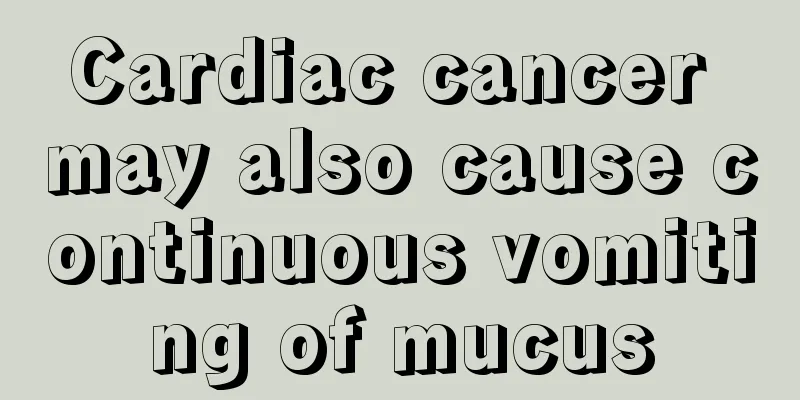The early symptoms of esophageal cancer should not be ignored. Do you know these signals?

|
Ms. Wang is 45 years old and is healthy and has a regular lifestyle. A month ago, she began to have difficulty swallowing food. At first, she thought it was just a sore throat and didn't pay much attention to it. Until recently, she found that she not only had difficulty swallowing, but also had pain behind her sternum, and she realized the seriousness of the problem. After going to the hospital for a checkup, the doctor told her that she had esophageal cancer. Ms. Wang regretted not paying attention to the warning signals from her body earlier. Early symptoms of esophageal cancer Esophageal cancer is a common malignant tumor of the digestive tract. Its early symptoms are often not obvious and are easily overlooked. However, early detection and treatment are crucial to improving the cure rate. The following are some symptoms that may occur in the early stages of esophageal cancer. I hope everyone can pay attention to them. Dysphagia is the most common early symptom of esophageal cancer. At first, patients may only feel discomfort when swallowing solid food. As the disease progresses, liquid food and saliva may also become difficult to swallow. Dysphagia usually worsens gradually, so if this happens, you should see a doctor immediately. Pain behind the sternum is also one of the early signs of esophageal cancer. This pain may get worse when you eat, or even feel like burning or stabbing pain when you swallow. Pain behind the sternum is often mistaken for acid reflux or heart problems, but if the pain persists or gradually gets worse, you should be highly alert. Third, loss of appetite and weight loss are also early manifestations of esophageal cancer. Due to dysphagia and pain behind the sternum, the patient eats less, resulting in rapid weight loss. If significant weight loss occurs in a short period of time, the cause should be checked as soon as possible. Hoarseness is also an important early sign of esophageal cancer. The tumor of patients with esophageal cancer may compress the recurrent laryngeal nerve, causing hoarseness. If hoarseness persists for more than two weeks and there is no other obvious reason, the possibility of esophageal cancer should be considered. Coughing and vomiting blood are also early symptoms of esophageal cancer. Tumors erode the esophageal wall or adjacent organs, which may cause coughing and even coughing up or vomiting blood. If unexplained coughing and vomiting blood occur, you should seek medical attention immediately. Prevention and inspection To prevent esophageal cancer, everyone should develop healthy living habits. Quit smoking and limit alcohol consumption, as tobacco and alcohol are important risk factors for esophageal cancer. Eat a balanced diet, avoid overheated, hard, or spicy foods, and eat more fresh vegetables and fruits. Maintain good oral hygiene and avoid eating moldy foods. Regular physical examinations are also an important measure to prevent esophageal cancer. For people with a family history of esophageal cancer or long-term smokers and drinkers, it is recommended to undergo a gastroscopy once a year. Early detection of esophageal cancer can be effectively treated through endoscopic surgery or radiotherapy, thereby increasing the cure rate. Ms. Wang's story reminds us that any physical discomfort should not be ignored. Although the early symptoms of esophageal cancer are not obvious, as long as we are vigilant and seek medical treatment in time, we can detect and treat it early to avoid worsening of the disease. I hope everyone can pay attention to their own health, pay attention to every signal sent by the body, and stay away from the threat of esophageal cancer. |
<<: Early symptoms of laryngeal cancer revealed: Do you know these signs?
>>: Early symptoms of bone cancer revealed: Don’t ignore these signals!
Recommend
How viruses reproduce
Most diseases are caused by viral infections, esp...
Recurrence rate after bone cancer amputation
Although our current medical technology has made ...
What are the effects of wisdom tooth extraction
If wisdom teeth do not grow in completely and pai...
What should I do if my hands itch after peeling the yam?
Yam has many nutritional values and is usually ...
Can I eat lean meat in the late stage of liver cancer?
Can I eat lean meat in the late stage of liver ca...
The role of targeted drugs for breast cancer
Commonly used targeted drugs for breast cancer pa...
Pain in the temple
The temples are located on both sides of our fore...
Evaluation of the Pancreatic Cancer Palliative Care Program
The radical surgical resection rate of pancreatic...
Is angular cheilitis contagious? Why do people get sick?
Angular cheilitis is an inflammation that occurs ...
What causes teratoma
Teratoma is caused by genetic factors, mental fac...
Will the baby be born early if it is bigger?
During the development process, the fetus may app...
Is cervical nerve compression serious?
For today's young people, the number of patie...
How long can you live with hemodialysis
Many people who suffer from some difficult-to-tre...
Tips for removing acne scars
Acne, as a skin disease, is a major symptom that ...
Will untreated teratoma shorten lifespan?
Teratomas originate from the reproductive cells o...









